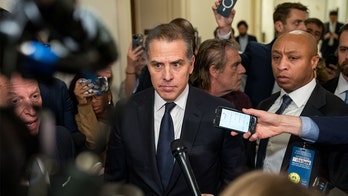We're one year away from the 2012 elections, but votes cast in the coming days will say a great deal about the political direction of the nation as Americans prepare to pick a president. Even as Republican candidates continue to audition for their party's nomination, it's the voters who will take center stage this month.
The biggest drama in this November's off-year elections fittingly comes from Ohio. The same state that could make or break President Obama's re-election hopes a year from now will see voters go to the polls on Nov. 8 to cast judgment on the president's signature program - a health law that requires all Americans to purchase private insurance or be enrolled in a government program.
Other states have passed similar measures to the proposed amendment to the Ohio state constitution that would prohibit any such insurance mandate from being imposed on the residents of the Buckeye State. But the stakes are higher in must-win Ohio. If the president sees voters in the king of swing states still riled up about the biggest accomplishment of his term, it will be a disquieting sign for him and his fellow Democrats.
Ohio voters will also decide on a ballot initiative backed by Democrats and labor groups that would roll back a new law by Republican Gov. John Kasich that restricts the collective bargaining power of public employee unions. Government worker groups have poured more than $30 million into the effort to repeal the law and conservative and business groups have been fighting back. It will be a test of the organizing clout of big labor and the popularity of a new crop of conservatives elected in the 2010 Republican wave.
In the Western swing state of Colorado, the Democratic argument for higher taxes to finance government payrolls and public works projects will be put to the test as voters weigh in on a proposal to increase state income and sales taxes for five years to boost education spending in the state. If public sector unions can push through a tax hike here, it will bode well for Obama keeping Colorado blue next year.
Meanwhile, in Mississippi, voters will weigh in on a trio of conservative policy proposals.
The most controversial is a measure that would change the state constitution to say explicitly that human life begins at the moment of conception and extend full human rights to unborn children, effectively outlawing abortion in the state. While pro-choice groups have vowed to fight the amendment in court if it passes, pro-life leaders are looking to Mississippi as a possible blueprint for ending the practice of elective abortions across the nation.
Mississippi voters will also have their say on a measure that would make it harder for governments to take private property by eminent domain and another that would require voters to show photo identification in order to cast their ballots in future elections. Democrats charge that the latter measure will disenfranchise poor and minority voters who they say are less likely to have drivers licenses while Republicans maintain that the step is necessary to control voter fraud and to keep illegal immigrants from voting.
Voters in New Jersey and Virginia will also head to the polls on Nov. 8 for their states' midterm legislative elections. In 2009, the success of Republicans Chris Christie in New Jersey and Bob McDonnell in Virginia foreshadowed the Republican wave of 2010. While these legislative elections will be referenda on the first two years of governance by Christie and McDonnell, they will also be measures of voter turnout and intensity for Democrats and Republicans. With Virginia especially shaping up as a key to 2012, the local races will help tell a national story.
Kentucky voters will also go to the polls, but Democratic incumbent Gov. Steve Beshear seems headed to certain victory after successfully insulating himself from Republican efforts to link him to Obama, who remains direly unpopular in the Bluegrass State.
While voters are weighing local issues this month, the Republican presidential contenders will be thinking locally too. With the Iowa caucuses just nine weeks away and primary elections in New Hampshire, South Carolina, Florida and Nevada stacked up in the following weeks, time is running short for the GOP field.
As Iowa Republicans prepare to make their final decisions, they'll have plenty of chances to review their options with a series of speeches and candidate forums. Some will deal with the economy and others are to be focused on the social issue that may determine the winner in the Hawkeye State. For Herman Cain, Texas Gov. Rick Perry and former House Speaker Newt Gingrich, a strong showing in Iowa could propel them forward while a stumble could end their presidential hopes, so they can hardly afford to pass up any opportunity to talk to voters there.
The Republicans are also set to return to the debate stage this month, but how many will show? Perry has committed to the next contest, a CNBC showdown on the economy in Michigan on Nov. 9, but isn't making any promises about future contests, including one on foreign policy and national security hosted by the American Enterprise Institute and the Heritage foundation to be aired by CNN on Nov. 15.
The national security discussion could prove crucial for frontrunner Cain who has struggled with foreign affairs questions in other forums. But Cain may get a chance to hone his debate performance as he and Gingrich engage in a Lincoln-Douglas style debate as part of a Texas Tea Party fundraiser outside of Houston on Nov. 5.
The 1858 Illinois Senate contest between Abraham Lincoln and Stephen Douglas featured a series of hours-long debates that featured no moderator, only a timekeeper.




